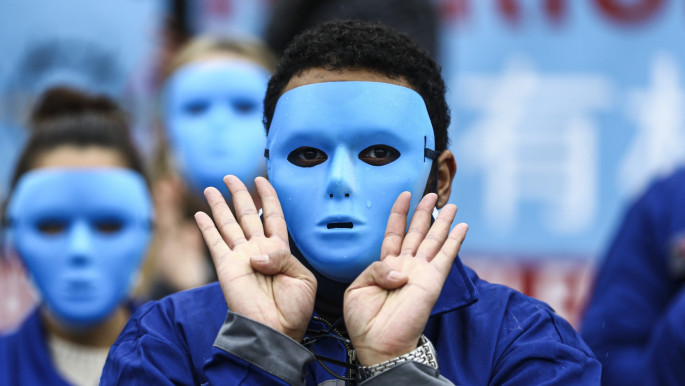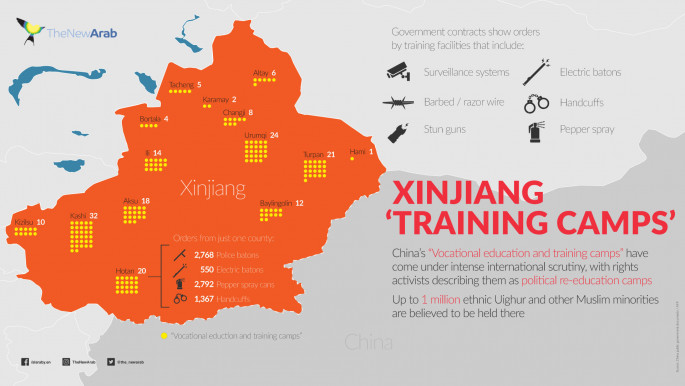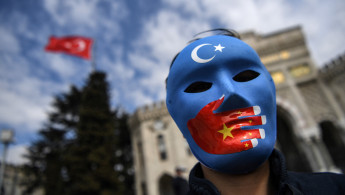How China's 'wolf warrior' diplomacy fuelled a political storm in Turkey
Two senior opposition figures tweeted in support of its victims, the Uighur people, an ethnic Turkic Muslim minority in China who continue to suffer under the Chinese Communist Party.
Mansur Yavas, Ankara's mayor and a member of the Republican People's Party (CHP), and former member of the far-right Nationalist Movement Party (MHP), said, "Although 31 years have already passed, we still feel the pain of the massacre in East Turkistan as on the first day. I remember the martyrs of Baren with mercy".
Likewise, Meral Aksener, head of the right-wing opposition party (IYI), saluted the Uighurs, "who did not submit to Chinese captivity in the Baren massacre." She added, "We will not forget our kinsmen in captivity, and we will not remain silent about their persecution. East Turkistan will definitely become independent one day!"
Within less than two hours, the Chinese Embassy in Turkey took to Twitter to respond. It condemned the statements of the Turkish opposition figures and vehemently opposed "any challenge by any person or power to China's sovereignty and territorial integrity." The embassy threatened that it "reserves the right to respond properly" and tagged the two Turkish officials in its tweet.
The Turkish Foreign Ministry swiftly responded by summoning the Chinese ambassador. However, the spokesperson of China's foreign minister defended the behaviour of its diplomatic mission in Ankara, saying "it was absolutely appropriate." The Chinese official claimed that the Turkish officials were encouraging "terrorists" in China.
 |
A diplomatic uproar erupted in Turkey against the backdrop of commemorating a deadly April 1990 conflict between Uighur separatists and Chinese government forces |  |
China's concentration camps
Linking the Muslim Uighur population to terrorism has become a habit for the Chinese authorities since the US launched its global war on terror two decades ago. The Chinese government tends to dismiss its mistreatment of the Muslim minority by promoting bogus claims linking the Uighur people to terrorism.
For years, China has been holding captive up to three million Uighurs in concentration camps in Xinjiang, with the intention of destroying their beliefs, culture, language, tradition, family bonds, and most importantly, de-Islamizing them under unbearable conditions.
 |
|
| Read more: Why the Uighur genocide in China matters |
In 2018, the Chinese government denied UN-panel findings on the treatment of Uighurs. However, when evidence including geo-locations, photos, and official documents of the camps surfaced, the Chinese authorities claimed that these camps were for educational and training purposes to rehabilitate Uighurs, make them better citizens, and stopping their women from being "baby-making machines."
Last month, Newlines Institute for Strategy and Policy released the findings of the first independent legal examination of the practices and measures of the Chinese government against the Uighurs. According to the conclusions of the report undertaken by dozens of human rights and international law experts, Beijing is engaged in genocidal acts against the Uighur people.
During his visit to Turkey last March, China's Foreign Minister Wang Yi said, "China is willing to work with Turkey to enhance mutual trust, deepen mutually beneficial cooperation, and elevate the strategic cooperative relations to a new level."
The recent diplomatic Twitter spat casts a shadow over these statements. Although it is a rare incident, the undiplomatic behaviour of the Chinese diplomats has become the norm recently in many parts of the world. The bold, unusual, and aggressive behaviour has a name too: 'wolf warrior diplomacy'.
 |
By resorting to 'wolf warrior' diplomacy against Turkey, China is not only hindering the prospects for bilateral relations but also inserting itself into the country's highly polarised political theatre |  |
Wolf warriors
This new form of diplomacy marks the rise of China on the global stage. The aggressive behaviour is the result of achieving economic might, soaring nationalism, and high self-confidence. It is a striking departure from the long-standing "lie low" guiding principle of Deng Xiaoping, which shaped Chinese behaviour during much of its rise in the international order. It resembles President Xi Jinping's footprint on China and his "national rejuvenation."
In some countries, China's top diplomats have been setting the tone. In April 2020, the Chinese ambassador to Iran traded barbs with the spokesperson of the Iranian Health Ministry, causing a political uproar. Some Iranian officials called on their country's Foreign Ministry to summon the ambassador, but instead, the ministry ended up praising China.
Chinese ambassadors to European countries are no less aggressive. For example, China's ambassador to Sweden has become a frequent guest at the Swedish Foreign Ministry due to repeated summons – which have exceeded 40 times in just two years.
His unusual behaviour against critical journalists and public figures on almost a weekly basis have made him and his embassy a case study for Swedish political scientists. In one of his wolf warrior diplomacy moments, he told Swedish public radio, "We treat our friends with fine wine, but for our enemies, we got shotguns." Earlier this month, the Chinese embassy threatened a journalist, asking him to stop his criticism or "face the consequences of your actions."
China's top diplomat to France refused to comply last month with summons over 'insults and threats' to a researcher and several MPs. In undiplomatic behaviour, the embassy called a researcher a "small-time thug", an "ideological troll", and a "crazed hyena". The same thing happened in or against many countries, including Denmark, Britain, Australia, and elsewhere.
Defenders of the strategy argue that this assertive behaviour is meant to defend Beijing and its interests worldwide against smear campaigns, fake news, and misinformation. Critics, however, say that the strategy has damaged China's image far beyond what its opponents could do.
 |
|
| Click to enlarge |
Creating leverage against Turkey?
China has not been popular in Turkey at any point. Yet, the Western reaction to the 2016 coup attempt, the US-alliance with the Kurdish PYD – the Syrian offshoot of the Kurdistan Workers' Party (PKK), considered a terrorist organisation - and the engagement of some EU countries in what Ankara deems hostile policies have convinced some in Turkey of the need to improve relations with Beijing.
On the other hand, when Turkey's economic conditions deteriorated in 2018, Beijing saw a golden opportunity to step in. Since then, it has been buying majority stakes in several infrastructure projects and companies in Turkey. Additionally, it has noticeably increased its loans to Ankara in what is believed to be political-economic leverage against the Turkish government.
In July 2018, the Industrial and Commercial Bank of China (ICBC) approved a $3.6-billion loan package for Turkish energy and transportation sector investments, including the private sector, public institutions, and banks. Within less than a year, China's central bank transferred $1 billion worth of funds to Turkey, the biggest of its kind since the currency swap agreement between the two countries in 2012.
Last August, the Asian Infrastructure Investment Bank (AIIB) approved 70 million euros ($83.37 million) to Turkey to help the country deal with the Covid-19 pandemic and the previously approved $500 million to two development banks.
The 'wolf warrior' meets Turkey's rising 'grey wolf'
In Turkic mythology, the grey wolf is a sacred animal and national symbol. It bears many symbolic meanings and is connected to several legends that explain the origin of the Turkic people. Ironically, one famous tale takes place in China.
According to the legend, Asina, a female grey wolf, helped the only boy left after Chinese soldiers raided his home village and killed everyone. Asina became the mother of the Turkish people and ultimately guided the Turks to salvation and glory.
 |
As a home for the largest Uighur community in the world outside of China, the minority group enjoys broad cross-political and ideological support in Turkey |  |
Nationalism in Turkey has been on the rise in recent years. As a home for the largest Uighur community in the world outside of China, the minority group enjoys broad cross-political and ideological support.
In 2009, Erdogan was accused of picking a fight with China over its crackdown on the Uighurs. He accused Beijing of committing "nearly genocide" and even threatened to use Ankara's capacity as a non-permanent member of the UN Security Council to raise the issue internationally. Apparently, the US, Europe, and the international community were not interested at the time.
Currently, Erdogan's critics and opponents criticise the Turkish government for being soft on China, citing Beijing's increasing economic influence, the extraction agreement between the two countries, and Ankara's over-dependence on China's Covid-19 vaccine.
 |
|
| Read more: How Uighur women's bodies became a battleground for China's coercive population control |
Although the Chinese government ratified the 2017 extraction agreement with Turkey in December 2020, Ankara has not approved it yet. The Turkish government says it is up to the parliament to ratify it, but even if it chooses to do so, it will be similar to the ones Turkey has with other countries.
On 8 April, Turkey rejected a request by Beijing to extradite prominent Uighur figure Abduqadir Yapchan to China to face "terrorism" charges. The court also lifted judicial control and travel restrictions on him. Beijing did not receive that verdict lightly. It urged Ankara to "reverse this wrong verdict", otherwise it will have "a severe negative impact on China-Turkey relations".
By resorting to wolf warrior diplomacy against Turkey, China is not only hindering the prospects for bilateral relations but also inserting itself into the country's highly polarised political theatre. Turkish officials will either have to ignore such behaviour and risk looking weak or respond and risk being dragged by Chinese officials and the Turkish opposition to unfavourable places.
In other words, such behaviour from China's top officials is expected to fuel 'grey wolf' nationalism in Turkey, ultimately leaving behind consequences on several fronts. Therefore, unless Beijing realises that such behaviour is undermining the Turkish government and Turkey-China relations, its wolf warrior diplomacy will always be met by Turkey's grey wolf nationalism.
Ali Bakir is a research assistant Professor at Ibn Khaldon Center for Humanities and Social
Sciences, a political risk analyst, and consultant.
He follows geopolitical and security trends in the Middle East, with a special focus on Turkey's foreign and defence policies, Turkey-Arab and Turkey-Gulf relations.



